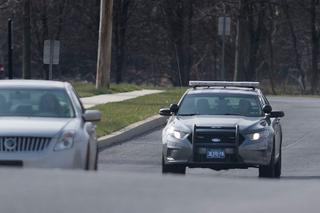Spotlight PA is an independent, non-partisan newsroom powered by The Philadelphia Inquirer in partnership with PennLive/The Patriot-News, TribLIVE/Pittsburgh Tribune-Review, and WITF Public Media. Sign up for our free weekly newsletter.
This article is a collaboration with The Appeal.
Around 10 a.m. on Nov. 6, 2013, a Pennsylvania state trooper pulled over a minivan on Interstate 81. He later wrote that he had seen a GPS device mounted on the car’s windshield, possibly obstructing the driver’s view.
While talking to the two people in the car — a man and his nephew, who said they were traveling from North Carolina — the trooper wrote that he noticed some large moving boxes covered by a blanket, according to the arrest affidavit. The trooper then issued a warning to the driver.
But the trooper continued to ask questions without notifying the driver or the passenger that they were legally free to go. After several more questions, the trooper asked to search the vehicle. The owner of the car said no.
The trooper’s main job that day was highway interdiction, a practice that involves looking out for drugs traveling along the state’s main roads and highways. A common tactic in highway interdiction is the use of pretextual stops, in which officers pull over motorists for alleged traffic violations, like speeding or traveling too close to another vehicle, in an effort to investigate if the people in the vehicle are involved in criminal activity.
The stops alone are generally legal, but courts have set limits and rules on how far officers can go to investigate, and on how long motorists can be detained.
In order to conduct a search, police officers have to be able to prove that they have more than a hunch that a crime is being committed. The proof can vary, but oftentimes it is the smell of marijuana or something more tangible, like paraphernalia visible from outside the vehicle. When officers lack that physical evidence, they often question people, relying on training that they say helps spot people lying or acting erratically.
The officer’s affidavit, a prosecutor’s first piece of evidence to move forward with a charge, did not mention any tangible proof nor erratic behavior during the I-81 stop. Instead, the officer wrote, “I noticed criminal indicators indicative of persons involved in criminal activity.”
The officer detained both people while a K-9 unit arrived to search the vehicle, and eventually, the dog alerted the officers to contraband in the van: hundreds of cartons of untaxed cigarettes. The driver and passenger were both charged with felony and misdemeanor counts.
More than 18 months after the charges were initially filed against the two, a judge in Cumberland County determined the search was illegal and suppressed all of the evidence found.
The charges against the two were dismissed.
While state police say these pretextual stops and searches effectively uncover drugs and weapons, a two-month review by The Appeal and Spotlight PA found many of them are conducted illegally and eventually get thrown out in court. There is also no way to tell how many of them turn up nothing illegal, because state police don’t keep track of them or their outcomes.
Defense and civil rights attorneys and educators compare the searches to a version of highway stop-and-frisk, in which troopers pull over as many people as possible for small traffic violations in order to find drugs in some instances, thus justifying all of the stops. By casting a wide net, however, certain people may be disproportionately targeted despite having done nothing wrong.
The Appeal and Spotlight PA reviewed 32 cases from 2016 to 2020 that arose from stops by troopers with the Pennsylvania State Police interdiction unit in Cumberland, Franklin, and Dauphin Counties. The news organizations analyzed dozens of affidavits and court documents from the stops, and interviewed researchers who study traffic stops, civil rights attorneys, and police training experts.
In total, eight cases reviewed by The Appeal and Spotlight PA were thrown out in court because of the police’s failure to establish probable cause, while nine more are still active and several have pending motions to suppress. More than a third of the cases have been sealed from public view because the charges were dismissed or withdrawn.
To justify their searches, state police often claimed that a driver was nervous, sweating, or eating. One officer went so far as to say a dollar-sign tattoo on a man’s neck was an indicator of criminal activity that justified detaining him for a K-9 search. Officers also used the same language to justify their stops, no matter the context or circumstances of the arrest, a violation of their training.
Police also held people during traffic stops longer than legally allowed. In one case, a man was held for nearly two hours before he was arrested. Drivers also had little choice in whether to allow police to conduct a search of their vehicles. In the review of cases, even when drivers had the legal right to deny a search, police still called in K-9 units, which courts have said is not an invasion of privacy.
More than half of the cases reviewed by the news organizations involved charges against a Black person, despite Black people accounting for only about 10% of the three counties’ population. For years, Pennsylvania State Police had stopped gathering race data during traffic stops, making it difficult to know how often people of color were pulled over and searched. After a Spotlight PA story published last year reported on the practice, the department said they would restart tracking racial data during traffic stops.
Critics also point the finger at prosecutors, who continue to bring these cases despite their shaky legal foundation.
“A police officer can go make an arrest and do what they do, but it’s up to the prosecutor if that arrest goes anywhere,” said Jamila Hodge, director of the Reshaping Prosecution Program at the Vera Institute of Justice.
So long as prosecutors continue charging people in these kinds of cases, critics say, police officers are likely to continue conducting illegal searches during traffic stops.

Mere suspicion
State police oversee large swaths of highways, interstates, and roads, as well as close to 1,800 municipalities across the commonwealth that don’t have their own full-time police departments. There are 16 police barracks across Pennsylvania, each responsible for a handful of the state’s 67 counties.
In 2019, Pennsylvania State Police conducted close to 1 million traffic stops. In order to pull someone over, a trooper has to have “mere suspicion” of a crime, said Jeff Fagan, director of Columbia Law School’s Center for Crime, Community, and Law.
“It’s simple, officers can pull you over for any suspected violation of a state’s vehicle or traffic code,” he said. “The laws are vague and often expansive. Mere suspicion is sufficient. Suspicion that a passenger is not wearing a seat belt, suspicion that a brake light is not working, suspicion that a driver failed to signal before changing lanes.”
In the dozens of cases The Appeal and Spotlight PA reviewed, troopers tasked with interdiction used the most mundane of traffic laws, such as driving in the left lane for too long or tires hitting the white line on the freeway’s shoulder, to pull drivers over and ask probing questions.
“You’re not necessarily focusing on the most egregious violations that are causal,” said Lt. Col. Scott Price, deputy commissioner of operations for the state police. He said that seemingly minor stops are often how officers get the opportunity to find bigger violations, such as drugs or weapons. For example, troopers looking for DUIs won’t only stop people who are swerving.
The Appeal’s and Spotlight PA’s review also found that police often held people for longer periods than necessary. According to a U.S. Supreme Court decision in 2015, drivers can’t be detained by police for any period longer than what would be reasonable. A broken taillight, in other words, should not result in a three-hour traffic stop.
But in one instance, state troopers pulled over and detained two men for six hours while they searched the owner’s car. A trooper pulled the driver over for an unlit license plate and speeding, and conducted a search based on the passenger’s conflicting statements. They ended up finding a small bag of heroin concealed in a DVD case.
“The ends do not justify this,” said Jonathan Smith, executive director of the Washington Lawyers’ Committee for Civil Rights and Urban Affairs. “If you illegally search a bunch of drivers and find some paraphernalia, that doesn’t justify you illegally searching the other drivers.”
It is hard to know how often police conduct these kinds of searches because state police don’t track them. When asked if it had aggregate data for when K-9 units are dispatched versus how often drugs are found, Pennsylvania State Police said “there is no specific audit on the frequency of calls for canine assistance in relation to contraband located.”

‘This is shocking’
The Appeal and Spotlight PA found that police use boilerplate language on affidavits to justify keeping people longer than legally allowed.
Affidavits, according to Pennsylvania State Police, should be unique documents, articulating the facts behind why charges are being brought and tailored to each person. Boilerplate language would be a violation of their training, said a state police official. But in nearly every affidavit pulled, officers quoted — almost verbatim — that some kind of “criminal activity was observed.”
And that should raise alarm signals for prosecutors who look at these cases, said David Harris, a law professor at the University of Pittsburgh who studies police training and reviewed a few of the affidavits gathered by The Appeal and Spotlight PA.
“This is shocking,” he said, referring to the near-identical language from the police reports. “Affidavits essentially justify an officer to take away someone’s liberty; the standard needs to be set much higher. If I was a prosecutor, I would be throwing these out.”
But prosecutors overwhelmingly pursue charges anyway. In the past five years of cases reviewed, only three cases were dropped by magistrate judges. In 90% of the cases, prosecutors decided to follow through with charges in court.
Fred Barajas, a Hispanic man from California, took a plea deal before a judge could rule on his claim that a state trooper had illegally searched his vehicle in May 2019.
A trooper had pulled him over for speeding on the turnpike in Franklin County. In the affidavit of probable cause, the officer wrote that he noticed “indicators of criminal activity” while talking to Barajas. The indicators, according to a motion to suppress filed by Barajas’ lawyer, were that Barajas appeared nervous with shaking hands, a facial twitch, and a large dollar sign tattooed behind his right ear.
The trooper held Barajas for more than an hour, during which time a K-9 unit was dispatched and alerted troopers to 1,500 THC vape cartridges in the backseat compartment.
Pennsylvania State Police charged him with possession with intent to deliver, while the court held him on $50,000 cash bail for two days before paying a bondsman for his release. Barajas ultimately pleaded to a reduced charge and a sentence of time served plus more than $1,600 in fines, fees, and court costs in a deal worked out with prosecutors. He declined to comment for this story.
According to Hodge of the Vera Institute of Justice, prosecutors who offer these kinds of plea deals in cases that appear to involve police misconduct are giving permission for troopers to continue acting in a way that harms and oppresses people of color.
Hodge said prosecutors have the power to bring about much of the change in police reform that recent protests have called for by simply refusing to bring charges or dismissing cases where there is apparent police misconduct.
It’s a power play that has shown promise in California’s Bay Area, where San Francisco District Attorney Chesa Boudin recently attempted to limit police misconduct by instituting a policy on how his office will deal with cases that arise from pretextual searches. Boudin described the tactic as disproportionately harming minority communities and allowing racial profiling.
Under the policy, his office will only bring criminal charges for possession of contraband if police can articulate independent probable cause, such as drugs or guns seen in plain view.
“It’s more than just police accountability,” Hodge said. “It is imperative in this moment that prosecutors — who are one of the most powerful actors in this system that is fundamentally flawed — have to also step up and take a hard look in the mirror and change their own policies.”
But while Fordham University Professor of Law John Pfaff agreed that prosecutors have an ethical duty to act as a check on police, he said he questions if that is enough to bring about change to policing.
Police in only five Pennsylvania counties must seek district attorney approval when filing criminal charges. It can take several days or even weeks before the district attorney’s office gets involved with a case, and during that time, the person charged could be held in jail on bail. Even if prosecutors ultimately dismiss the charges, he noted, the criminal legal system will have already inflicted harm.
“To some probably significant extent, much of the arrest practices are not necessarily aimed at anything beyond the arrest,” he said. “That has to be regulated at the level of the police.”
100% ESSENTIAL: Spotlight PA relies on funding from foundations and readers like you who are committed to accountability journalism that gets results. If you value this reporting, please give a gift today at spotlightpa.org/donate.
